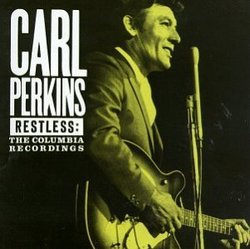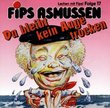| All Artists: Carl Perkins Title: Restless: Columbia Recordings Members Wishing: 0 Total Copies: 0 Label: Sony Original Release Date: 1/1/1992 Re-Release Date: 5/12/1992 Genres: Pop, Rock Styles: Oldies & Retro, Rock Guitarists Number of Discs: 1 SwapaCD Credits: 1 UPCs: 074644889628, 074644889642 |
Search - Carl Perkins :: Restless: Columbia Recordings
 | Carl Perkins Restless: Columbia Recordings Genres: Pop, Rock
|
Larger Image |
CD DetailsSimilar CDs |
CD ReviewsJive After Five Carl Savich | Detroit, MI, USA | 09/18/2008 (5 out of 5 stars) "Carl Perkins and Johnny Cash left Sun Records in 1958 and signed with Columbia. Carl Perkins recorded the Whola Lotta Shakin' album, an album of cover songs, on Columbia in 1958 and a series of singles up to 1963. On the Whole Lotta Shakin' LP, Perkins is shown playing a Fender Stratocaster guitar, a change from his Gibson Les Paul and Switchmaster sound. The first single was Jive After Five and Pink Pedal Pushers which was released on a double-sided picture 45 by Columbia. Pink Pedal Pushers, which was also covered by Jerry Lee Lewis, reached no.17 on the country charts and no.91 on the Top 100 in May, 1958. Pointed Toe Shoes b/w Highway of Love made it to no.93 on the Hot 100 in June, 1959. Perkins released several teen and rock based singles such as Rockin' Record Hop, Levi Jacket (And a Long Tail Shirt), Pop, Let Me Have the Car, L-O-V-E-V-I-L-L-E, Sister Twister, and Hambone on Columbia, but they did not chart. In 1964, Perkins released the single Big Bad Blues on Decca. The Beatles released Matchbox in 1964 as a single which reached no.17 on the U.S. pop chart.
The first release on Columbia, Jive After Five, was about a teenager who worked as a soda jerk during the day but who wanted to go to the rockin' hops and dives at night. Like Rockin' Record Hop and Levi Jacket, the song was tailored for the teen rock and roll market. In Jive After Five, Perkins described the duties of a soda jerk: "All day long I'm filling orders, Taking in nickels, dimes and quarters, Cherry sodas and a chocolate shake Strawberry sundaes and a lemon phosphate. Time to clean the fountain, because it's almost five. You know me, dad, after five, I jive." Carl Perkins turned to songwriting in the 1960s. He wrote So Wrong for Patsy Cline in 1962, which reached no.14 on the country chart and no.85 on the pop chart. The song was included on her 12 Greatest Hits album which sold over 10 million copies, becoming an RIAA Diamond album. It was no.1 on the country charts and is one of the all-time best-selling country albums. In 1964, Carl Perkins embarked on a tour of England where he was able to meet The Beatles, who recorded three of his songs for their studio albums and performed and recorded his songs live for the BBC. Perkins jammed all night with the Beatles, missing his plane to the U.S. Perkins would continue to collaborate and work with the Beatles throughout his career. In 1969, John Lennon performed Blue Suede Shoes at the Toronto rock and roll revival concert with Eric Clapton on lead guitar. The song later appeared on the gold album on Apple entitled Live Peace in Toronto. In a 1975 Rolling Stone interview, John Lennon stated that Carl Perkins was the only artist that he could listen to for an entire album. The album that Lennon was most likely referencing was the 1957 Dance Album. Carl Perkins wrote The Ballad of Boot Hill for the 1965 Johnny Cash album Johnny Cash Sings the Ballads of the True West. Perkins also wrote "When You're Twenty-One" for the Johnny Cash Family Christmas album in 1972. In 1966, Perkins released Country Boy's Dream on Dollie which reached no.22 on the country charts beginning a comeback. The follow-up single Shine, Shine, Shine reached no.40 on the country charts in June, 1967. With the success of his collaborations with Johnny Cash, the national exposure from his role as a regular on the Johnny Cash Show, Carl Perkins was resigned by Columbia and in 1969 began a string of chart successes. Columbia released an album in 1969 entitled Carl Perkins on Top which featured Champaign, Illinois, a song Perkins co-wrote with Bob Dylan. Daddy Sang Bass was a Carl Perkins composition that Johnny Cash along with June Carter Cash recorded and released as a single, which was no.1 on the country charts for 6 weeks and which became a country gospel classic. Glen Campbell, the Statler Brothers, the Oak Ridge Boys, Leon Russell, Mel Tillis, Nat Stuckey, Jean Shepard, and Carl Story also covered the song. Carl Perkins also played lead guitar on the Johnny Cash smash hit single "A Boy Named Sue", which was no.1 on the country charts for 5 weeks and no.2 on the pop charts in 1969. Perkins released his Columbia single Restless in 1968, a hit single which reached no.20 in March, 1969, on the country charts and which was included on the Carl Perkins album on Harmony in 1970. Restless would later be covered by Mark O'Connor with an all-star ensemble. Perkins performed the song in 1995 with Tom Petty and the Heartbreakers on the Go Cat Go! album. The single Me Without You reached no.65 in June, 1971. Cotton Top climbed to no.53 on the country chart in December, 1971. In June, 1972, High On Love made it to no.60. In 1973, Perkins remade his 1956 Sun classic Dixie Fried for Mercury Records which was titled (Let's Get) Dixie Fried, which got to no.61 on the country chart. In 1985, Perkins celebrated the 30th anniversary of Blue Suede Shoes and the 1955 emergence of Sun Records and rock and roll. Perkins, Johnny Cash, Jerry Lee lewis, and Roy Orbison recorded an album entitled Class of '55. In 1986, the single from that album, The Birth Of Rock and Roll, was released as a picture sleeve single and reached no.31 on the country chart. In 1987, the Class Of '55 single made it to no.83 on the country chart. Carl Perkins continued to tour, to record new material, and to write new songs. In 1989, he co-wrote Let Me Tell You About Love for The Judds which became a no.1 country hit. He also wrote Wild Texas Wind for Dolly Parton's TV movie of the same name. Dolly Parton would record Carl Perkins' song Silver and Gold, which reached no.15 on the country chart. George Strait recorded When You're a Man on Your Own, which was written by Carl Perkins. Mark O'Connor recorded Restless in 1991 on his New Nashville Cats album with an all-star cast, the New Nashville Cats, which included Ricky Skaggs, Vince Gill, and Steve Wariner, which reached no.25 on the country chart and won a Grammy Award in 1992 for Best Country Vocal Collaboration. " |

 Track Listings (18) - Disc #1
Track Listings (18) - Disc #1

